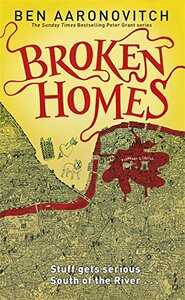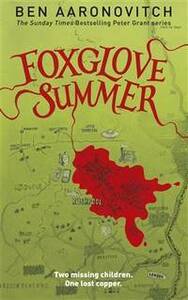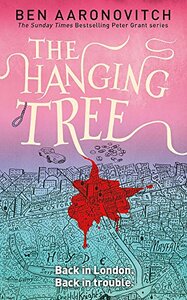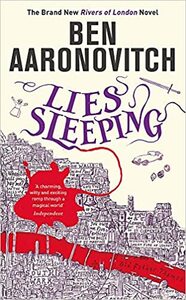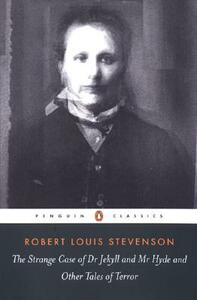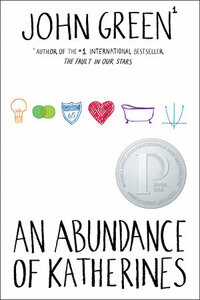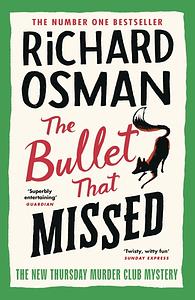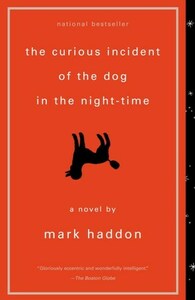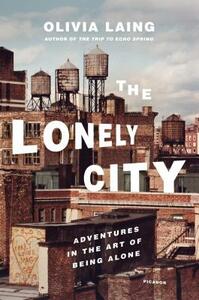Take a photo of a barcode or cover
oashackelford's Reviews (353)
In this Rivers of London book, PC Peter Grant is tracking down the Faceless man and trying to find and dismantle his operation when he starts to find out about magical objects built with the purpose of retaining magic for future use.
I don't really know how to say anything else about this book without giving away the plot but I really enjoyed the plot of this one. I like that Aaronovitch doesn't have unimportant characters that get left behind. The officers, informants, and criminals all feel like real people that have passions outside the framework we first meet them in. I do think that the other books in the series had their own plots that happened to further the overarching plot of all the novels, this one was written to only further the overarching plot as well as to teach us more about the rules of magic and the magical community.
I don't really know how to say anything else about this book without giving away the plot but I really enjoyed the plot of this one. I like that Aaronovitch doesn't have unimportant characters that get left behind. The officers, informants, and criminals all feel like real people that have passions outside the framework we first meet them in. I do think that the other books in the series had their own plots that happened to further the overarching plot of all the novels, this one was written to only further the overarching plot as well as to teach us more about the rules of magic and the magical community.
Another adventure for Constable Peter Grant as he continues his magical policing education. This time two kids are missing, knowing that sometimes children are used in evil magic, Nightengale sends Grant out to the sticks to investigate. Missing kids have to be found quickly, so with Beverly Brook and another constable, a local named Dominic, Grant gets to work quickly to determine whether or not the incident is magical in nature.
I thought this one was faster paced than previously. Rather than having two separate incidents that are later revealed to be connected, this one is all connected from the start. I think that only having one mystery to solve made the book feel faster this time because we didn't have to bounce between investigations at all. I think this one was also my favorite so far.
I thought this one was faster paced than previously. Rather than having two separate incidents that are later revealed to be connected, this one is all connected from the start. I think that only having one mystery to solve made the book feel faster this time because we didn't have to bounce between investigations at all. I think this one was also my favorite so far.
PC Peter Grant has a pretty normal life for a police officer. He has a nice girlfriend and he works for a special unit of the Met. Of course, though, nothing in his life is really normal. His girlfriend is a local river goddess and his special unit is made up of wizards who solve magical crimes. Lady Tyburn, another local river goddess, saved his life last Christmas when he was briefly trapped underground and now she has come to cash in her favor. Her daughter was caught up in a teen drug overdose. This being Peter's life, however, the straightforward case quickly becomes complicated with magical elements as Peter strives to clear Tyburn's name and find out how, once again, the faceless man is involved.
I think that the mysteries are becoming increasingly more interesting, although I am getting tired of the faceless man outmaneuvering Peter all of the time. Also, I know that these books are not looking to give me all of the explanations that I want, or all of the rules to the magical world, but sometimes I would like some kind of explanation. Aaronovitch has introduced Chinese practitioners twice but done nothing with them so far, he has introduced new magical beings, but not what they are trying to achieve by committing these crimes, and he only gives vague descriptions and theories for some things. I understand that this is supposed to be from Peter's point of view and that he doesn't have the answers to some of these questions, but I still wish I knew.
Despite this, the writing is incredible. Obviously the books include magic, but in a consistent way that makes it feel realistic. That allows the books to feel more like police procedurals or regular crime novels, even though they have magical elements. I am really looking forward to reading the next one!
I think that the mysteries are becoming increasingly more interesting, although I am getting tired of the faceless man outmaneuvering Peter all of the time. Also, I know that these books are not looking to give me all of the explanations that I want, or all of the rules to the magical world, but sometimes I would like some kind of explanation. Aaronovitch has introduced Chinese practitioners twice but done nothing with them so far, he has introduced new magical beings, but not what they are trying to achieve by committing these crimes, and he only gives vague descriptions and theories for some things. I understand that this is supposed to be from Peter's point of view and that he doesn't have the answers to some of these questions, but I still wish I knew.
Despite this, the writing is incredible. Obviously the books include magic, but in a consistent way that makes it feel realistic. That allows the books to feel more like police procedurals or regular crime novels, even though they have magical elements. I am really looking forward to reading the next one!
Martin Chorley remains as elusive as ever and Nightingale and the Starling do everything in their power to try and figure out what he is planning and how to stop him. They know that the plan has something to do with Leslie and Mr. Punch, but they still aren't sure how it all connects, and, of course, Peter doesn't know how to investigate anything without putting himself into danger.
I liked this one a lot. The last couple of books seemed like each one followed the same sequence. What is Martin Chorley up to? Will Leslie ever flip back to the good side? Hey we found out what he was up to, time to get some evidence. Oh no! A magic fight! Aw Leslie still won't come back to us, next book.
It was nice to have a change of pace in this book and I am curious and excited to learn where we go from here.
I liked this one a lot. The last couple of books seemed like each one followed the same sequence. What is Martin Chorley up to? Will Leslie ever flip back to the good side? Hey we found out what he was up to, time to get some evidence. Oh no! A magic fight! Aw Leslie still won't come back to us, next book.
It was nice to have a change of pace in this book and I am curious and excited to learn where we go from here.
I think that this book got back to its more investigative roots. I am kind of glad we are done with the faceless Man stuff for a while, although I am still wondering what happened to Leslie at the end of the day.
I thought that this was a good return to form, although I do think that the ending battle was lacking considering everything that went into building it up initially.
I thought that this was a good return to form, although I do think that the ending battle was lacking considering everything that went into building it up initially.
Elizabeth Best, spy extraordinaire and pensioner, has always kept her past life exactly where she wants it, in her past. Unfortunately it has now caught up with her. A man that she and her friends have taken to calling the Viking has ordered her to kill a former KGB Colonel that she is friends with, or he will kill Joyce. Elizabeth, never one for exactly following anyone's orders, takes it upon herself to fake a few deaths, form a few friendships and solve the murder that her friend wants her to solve this time, a cold case. It's a lot to take on for just one woman, but they don't call her Best for nothing.
I really love these pensioners. I think the whole premise that they are old and put people off their guard is so funny and the author, Richard Osman, keeps finding new ways to make it funny. I hope he writes at least another one, but I also wonder if he is trying to avoid these books going on for too long, as eventually old age would catch up with the characters.
I really love these pensioners. I think the whole premise that they are old and put people off their guard is so funny and the author, Richard Osman, keeps finding new ways to make it funny. I hope he writes at least another one, but I also wonder if he is trying to avoid these books going on for too long, as eventually old age would catch up with the characters.
Christopher isn't like the other kids at his school. He is interested in detecting and solving the mystery of who killed Wellington, his neighbor's dog. He is also good at Maths and Science. But Christopher struggles with the other parts of life, like what people's faces mean, and having too many people in a room all at once, with all of the noise and movement that comes with that. This book gives insight into Christopher's life, the struggles that he deals with, and the things that he does to overcome them.
I am not sure how I feel about this book. I picked it up because I thought that it was going to be a mystery, but the book isn't really about the mystery at the beginning. I do think that the book gave good insight to the struggles that someone who is neurodivergent might have, but I don't think that I get the book. I think that the point of the book is that Christopher learns that he can do anything he puts his mind to, and when the book was written I doubt that there was another book like this anywhere, but I feel like maybe we are shown this narrative too often now, and I need more nuance than what this book offers. Like I think that things have shifted from, "I can do hard things despite my differences," to "yes I have differences, but I am still a unique person who is more than my struggles." I think now we are used to hearing from a wider diversity of people and most of us have met neurodivergent people and we know what some of the struggles are, as a opposed to this being an introduction to them, and so we are more used to asking them more about their own interests and who they are as people.
I think this book does help the reader have sympathy for people who struggle communicating in a world that communicates a lot with faces and emotions, rather than just saying what we mean. I do think that especially for high schoolers who might lack sympathy, that this would be an important read.
I am not sure how I feel about this book. I picked it up because I thought that it was going to be a mystery, but the book isn't really about the mystery at the beginning. I do think that the book gave good insight to the struggles that someone who is neurodivergent might have, but I don't think that I get the book. I think that the point of the book is that Christopher learns that he can do anything he puts his mind to, and when the book was written I doubt that there was another book like this anywhere, but I feel like maybe we are shown this narrative too often now, and I need more nuance than what this book offers. Like I think that things have shifted from, "I can do hard things despite my differences," to "yes I have differences, but I am still a unique person who is more than my struggles." I think now we are used to hearing from a wider diversity of people and most of us have met neurodivergent people and we know what some of the struggles are, as a opposed to this being an introduction to them, and so we are more used to asking them more about their own interests and who they are as people.
I think this book does help the reader have sympathy for people who struggle communicating in a world that communicates a lot with faces and emotions, rather than just saying what we mean. I do think that especially for high schoolers who might lack sympathy, that this would be an important read.
The Lonely City, by Olivia Liang, is an exploration of the feeling of loneliness through the lens of artists and the city of New York as well as the author's own experiences. The book meanders from thought to thought exploring how loneliness is shown in art. How photographs of bodies, sewn together fruit, and even large groups of people can look lonely and about how bouts of loneliness in the artists' lives inspired them to make the kinds of art they made.
This book is an interesting look at loneliness but the book gives the reader the strange sensation of feeling the author's own loneliness as they read the book. As they recount how each of the artists was alone in their own ways you get the feelings of being removed from society and how awful it must feel to want to connect to others without really knowing how.
I don't know if the author's intent was to engender empathy in the reader for people on the fringes of society, or if the intent was solely therapeutic for the author, but the book does make you want to reach out and touch someone because it feels isolating to read it.
I did not enjoy this book for myself because I didn't like feeling lonely every time I read it, but I do think it is incredibly well researched and written. I think that if you like art that inspires a lot of emotion and when writers infuse their work with their own experiences, then this will be a good read for you. I just didn't like how I felt while reading it.
This book is an interesting look at loneliness but the book gives the reader the strange sensation of feeling the author's own loneliness as they read the book. As they recount how each of the artists was alone in their own ways you get the feelings of being removed from society and how awful it must feel to want to connect to others without really knowing how.
I don't know if the author's intent was to engender empathy in the reader for people on the fringes of society, or if the intent was solely therapeutic for the author, but the book does make you want to reach out and touch someone because it feels isolating to read it.
I did not enjoy this book for myself because I didn't like feeling lonely every time I read it, but I do think it is incredibly well researched and written. I think that if you like art that inspires a lot of emotion and when writers infuse their work with their own experiences, then this will be a good read for you. I just didn't like how I felt while reading it.
